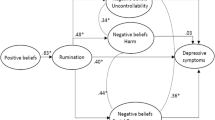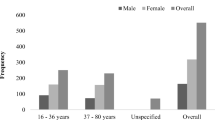Abstract
Depressive rumination has been found to be a critical factor in the onset and maintenance of depression [for a recent review, see Nolen-Hoeksema, In C. Papageorgiou, & A. Wells (Eds.), Depressive rumination: Nature, theory, and treatment (pp. 107–124). Chichester, UK: Wiley, 2004], but an issue still to be resolved is whether some aspects of depressive rumination are more damaging than others. Some studies have found depressive rumination to have a single factor, others describe several dimensions. This study addresses (a) whether a single or multi-factorial model is most appropriate, and if so, (b) which aspect of depressive rumination is the most pathological. In Study One, a measure of depressive rumination, the Rumination on Sadness Scale (RSS; Conway, Csank, Holm, & Blake, Journal of Personality Assessment, 75, 404–425, 2000), was given to 152 students (128 women). Reliability and validity for the RSS was corroborated. The RSS was then used to further investigate the multi-component nature of depressive rumination. Confirmatory Factor Analyses on the RSS revealed a three-factor solution; “ruminating about the reasons for my sadness” (Causal Analysis), “ruminating about the meaning of my sadness” (Understanding), and “uncontrollability of this ruminative thinking on my sadness” (Uncontrollability). In order to strengthen the three subscales, eight new items were added. Four items of the original RSS were deleted. In Study 2, using this extended scale (Leuven Adaptation of the Rumination on Sadness Scale; LARSS), the three-factor model was replicated in a second sample (N = 219). Depressive symptoms and the tendency to suppress negative thinking (Wenzlaff & Luxton, Cognitive Therapy and Research, 27, 293–308, 2003) were associated with Uncontrollability of ruminative thinking. Results confirm the importance of distinguishing different components in depressive rumination and tentatively suggest that the meta-ruminative factor, uncontrollability of rumination, is particularly problematic.
Similar content being viewed by others
References
Barker, C., Pistrang, N., & Elliott, R. (2002). Research methods in clinical psychology (2nd ed.). Chichester: John Wiley & Sons.
Beck, A. T., Rush, A., Shaw, B. F., & Emery, G. (1979). Cognitive therapy for depression. New York: Guilford Press.
Bentler, P. M. (1990). Comparative fit indices in structural models. Psychological Bulletin, 107, 238–246.
Bollen, K. A. (1989). Confirmatory factor analysis. In K. A. Bollen (Ed.), Structural equations with latent variables (pp. 226–318). New York: John Wiley & Sons.
Bouman, T. K., Luteijn, F., Albersnagel, F. A., & van der Ploeg, F. A. E. (1985). Enige ervaringen met de Beck Depression Inventory [Some experiences with the Beck Depression Inventory]. Gedrag, 13, 13–24.
Browne, M. W., & Cudeck, R. (1993). Alternative ways of assessing model fit. In K. A. Bollen, & J. S. Lang (Eds.), Testing structural equation models (pp. 136–162). Newbury Park, CA: Sage.
Cartwright-Hatton, S., & Wells, A. (1997). Beliefs about worry and intrusions: The meta-cognitions questionnaire and its correlates. Journal of Anxiety Disorders, 11, 279–296.
Conway, M., Csank, P. A. R., Holm, S. L., & Blake, C. K. (2000). On assessing individual differences in rumination on sadness. Journal of Personality Assessment, 75, 404–425.
Conway, M., Mendelson, M., Giannopoulos, C., Csank, P. A. R., & Holm, S. L. (2004). Childhood and adult sexual abuse, rumination on sadness, and dysphoria. Child Abuse & Neglect, 28, 393–410.
Fresco, D. M., Frankel, A. N., Mennin, D. S., Turk, C. L., & Heimberg, R. G. (2002). Distinct and overlapping features of rumination and worry: The relationship of cognitive production to negative affective states. Cognitive Therapy and Research, 26, 179–188.
Fritz, H. L. (1999). Rumination and adjustment to a first coronary event. Psychosomatic Medicine, 61, 105.
Hermans, D., Crombez, G., van Rijsoort, S., & Laeremans, I. (2002). De meta-cognities Vragenlijst [The Meta-Cognitions Questionnaire]. Gedragstherapie, 35, 341–352.
Hertel, P. T., & Gerstle, M. (2003). Depressive deficits in forgetting. Psychological Science, 14, 573–578.
Jöreskog, K. G., & Sörbom, D. (1993). LISREL ® 8: Structural equation modeling with the SIMPLIS command language. Chicago, IL: Scientific Software International.
Just, N., & Alloy, L. B. (1997). The response styles theory of depression: Tests and an extension of the theory. Journal of Abnormal Psychology, 106, 221–229.
Kerkhof, A., Hermans, D., Figee, A., Laeremans, I., Aardema, A., & Pieters, G. (2000). De Penn State Worry Questionnaire en de Worry Domains Questionnaire: Eerste resultaten bij Nederlandse en Vlaamse klinische en poliklinische populaties. [The PSWQ and the WDQ: first results from Dutch and Flemish clinical and polyclinical populations]. Gedragstherapie, 33, 135–145.
Luminet, O. (2004). Measurement of depressive rumination and associated constructs. In C. Papageorgiou, & A. Wells (Eds.), Depressive rumination: Nature, theory, and treatment (pp. 187–216). Chichester, UK: John Wiley & Sons.
Martin, L. L., & Tesser, A. (1996). Some ruminative thoughts. In R. Wyer Jr. (Ed.), Ruminative thoughts: Advances in social cognition (Vol. 11, pp. 1–47). Hillsdale, NJ: Erlbaum.
McFarland, C., & Buehler, R. (1998). The impact of negative affect on autobiographical memory: The role of self-focused attention to moods. Journal of Personality and Social Psychology, 75, 1424–1440.
Meyer, T. J., Miller, M. L., Metzger, R. L., & Borkovec, T. D. (1990). Development and validation of the Penn State Worry Questionnaire. Behaviour Research and Therapy, 28, 487–495.
Morrow, J., & Nolen-Hoeksema, S. (1990). Effects of responses to depression on the remediation of depressive affect. Journal of Personality and Social Psychology, 58, 519–527.
Nolen-Hoeksema, S. (1987). Sex differences in unipolar depression: Evidence and theory. Psychological Bulletin, 101, 259–282.
Nolen-Hoeksema, S. (1991). Responses to depression and their effects on the duration of depressive episodes. Journal of Abnormal Psychology, 100, 569–582.
Nolen-Hoeksema, S. (2000). The role of rumination in depressive disorders and mixed anxiety/depressive symptoms. Journal of Abnormal Psychology, 109, 504–511.
Nolen-Hoeksema, S. (2004). The response styles theory. In C. Papageorgiou, & A. Wells (Eds.), Depressive rumination: Nature, theory, and treatment (pp. 107–124). Chichester, UK: John Wiley & Sons.
Nolen-Hoeksema, S., & Davis, C. G. (1999). Thanks for sharing that: Ruminators and their social support network. Journal of Personality and Social Psychology, 77, 801–814.
Nolen-Hoeksema, S., & Morrow, J. (1991). A prospective study of depression and posttraumatic stress symptoms after a natural disaster: The 1989 Loma Prieta Earthquake. Journal of Personality and Social Psychology, 61, 115–121.
Nolen-Hoeksema, S., & Morrow, J. (1993). The effects of rumination and distraction on naturally-occurring depressed moods. Cognition and Emotion, 7, 561–570.
Nolen-Hoeksema, S., Morrow, J., & Fredrickson, B. L. (1993). Response styles and the duration of episodes of depressed mood. Journal of Abnormal Psychology, 102, 20–28.
Nolen-Hoeksema, S., Parker, L. E., & Larson, J. (1994). Ruminative coping with depressed mood following loss. Journal of Personality and Social Psychology, 67, 92–104.
Papageorgiou, C., & Wells, A. (1999). Process and meta-cognitive dimensions of depressive and anxious thoughts and relationships with emotional intensity. Clinical Psychology and Psychotherapy, 6, 156–162.
Papageorgiou, C., & Wells, A. (2001). Positive beliefs about depressive rumination: Development and preliminary validation of a self-report scale. Behavior Therapy, 32, 13–26.
Papageorgiou, C., & Wells, A. (2003a). Rumination and depression: Advances in theory and research. Cognitive Therapy and Research, 27, 243–245.
Papageorgiou, C., & Wells, A. (2003b). An empirical test of a clinical metacognitive model of rumination and depression. Cognitive Therapy and Research, 27, 261–273.
Papageorgiou, C., & Wells, A. (2004). Nature, functions, and beliefs about depressive rumination. In C. Papageorgiou, & A. Wells (Eds.), Depressive rumination: Nature, theory, and treatment (pp. 3–20). Chichester, UK: John Wiley & Sons.
Raes, F., Hermans, D., & Eelen P. (2003). De Nederlandstalige versie van de Ruminative Response Scale (RRS-NL) en de Rumination on Sadness Scale (RRS-NL). [The Dutch version of the Ruminative Response Scale (RRS-NL) and the Rumination on Sadness Scale (RRS-NL)]. Gedragstherapie, 36, 97–104.
Raes, F., Hermans, D., Williams, J. M. G., Beyers, W., Brunfaut, E., & Eelen, P. (2006). Reduced autobiographical memory specificity and rumination in predicting the course of depression. Journal of Abnormal Psychology, 115, 699–704.
Ramel, W., Goldin, P. R., Carmona, P. E., & McQuaid, J. R. (2004). The effects of mindfulness meditation on cognitive processes and affect in patients with past depression. Cognitive Therapy and Research, 28, 433–455.
Roberts, J. E., Gilboa, E., & Gotlib, I. H. (1998). Ruminative response style and vulnerability to episodes of dysphoria: Gender, neuroticism, and episode duration. Cognitive Therapy and Research, 22, 401–423.
Schmaling, K. B., Dimidjian, S., Katon, W., & Sullivan, M. (2002). Response styles among patients with minor depression and dysthemia in primary care. Journal of Abnormal Psychology, 111, 350–356.
Segerstrom, S. C., Tsao, J. C. I., Alden, L. E., & Craske, M. G. (2000). Worry and rumination: Repetitive thought as a concomitant and predictor of negative mood. Cognitive Therapy and Research, 24, 671–688.
Steiger, J. H. (1990). Structural model evaluation and modification: An interval estimation approach. Multivariate Behavioral Research, 25, 173–180.
Trapnell, P. D., & Campbell, J. D. (1999). Private self-consciousness and the five-factor model of personality: Distinguishing rumination from reflection. Journal of Personality and Social Psychology, 76, 284–304.
Treynor, W., Gonzalez, R., & Nolen-Hoeksema, S. (2003). Rumination reconsidered: A psychometric analysis. Cognitive Therapy and Research, 27, 247–259.
Van Rijsoort, S., Vervaeke, G., & Emmelkamp, P. (1997). De Penn State Worry Questionnaire en de Worry Domains Questionnaire: Eerste resultaten bij een normale Nederlandse populatie. [The Penn State Worry Questionnaire and the Worry Domains Questionnaire: First results in a normal Dutch population]. Gedragstherapie, 30, 121–128.
Watkins, E., & Teasdale, J. D. (2001). Rumination and overgeneral memory in depression: Effects of self-focus and analytic thinking. Journal of Abnormal Psychology, 110, 353–357.
Watkins, E., & Teasdale, J. D. (2004). Adaptive and maladaptive self-focus in depression. Journal of Affective Disorders, 82, 1–8.
Watkins, E., Teasdale, J. D., & Williams, R. M. (2000). Decentering and distraction reduce overgeneral autobiographical memory in depression. Psychological Medicine, 30, 911–920.
Wegner, D. M. (1994). Ironic processes of mental control. Psychological Review, 101, 34–52.
Wegner, D. M., & Wenzlaff, R. M. (1996). Mental control. In E. T. Higgins, & A. W. Kruglanski (Eds.), Social psychology: Handbook of basic principles (pp. 466–492). New York: Guilford Press.
Wenzlaff, R. M., & Bates, D. E. (1998). Unmasking a cognitive vulnerability to depression: How lapses in mental control reveal depressive thinking. Journal of Personality and Social Psychology, 75, 1559–1571.
Wenzlaff, R. M., & Luxton, D. D. (2003). The role of thought suppression in depressive rumination. Cognitive Therapy and Research, 27, 293–308.
Wenzlaff, R. M., Rude, S. S., Taylor, C. J., Stultz, C. H., & Sweatt, R. A. (2001). Beneath the veil of thought suppression: Attentional bias and depression risk. Cognition and Emotion, 15, 435–548.
Wyer R. S. Jr. (Ed.) (1996). Ruminative thoughts: Advances in social cognition (Vol. IX). Mahwah, NJ: Lawrence Erlbaum Associates.
Acknowledgements
Filip Raes, Dirk Hermans, Patricia Bijttebier and Paul Eelen, Department of Psychology, University of Leuven, Belgium; J. Mark G. Williams, Department of Psychiatry, University of Oxford. We thank Frederik Raes and Geert Pousset for their assistance in data collection. Correspondence concerning this article should be addressed to Filip Raes, Department of Psychology, University of Leuven, Tiensestraat 102, B-3000 Leuven, Belgium. Electronic mail may be sent to filip.raes@psy.kuleuven.be
Author information
Authors and Affiliations
Corresponding author
Rights and permissions
About this article
Cite this article
Raes, F., Hermans, D., Williams, J.M.G. et al. A “Triple W”-Model of Rumination on Sadness: Why Am I Feeling Sad, What’s the Meaning of My Sadness, and Wish I Could Stop Thinking About my Sadness (But I Can’t!). Cogn Ther Res 32, 526–541 (2008). https://doi.org/10.1007/s10608-007-9137-y
Received:
Accepted:
Published:
Issue Date:
DOI: https://doi.org/10.1007/s10608-007-9137-y




